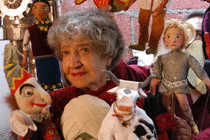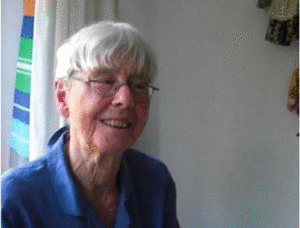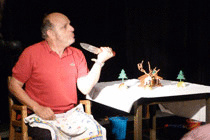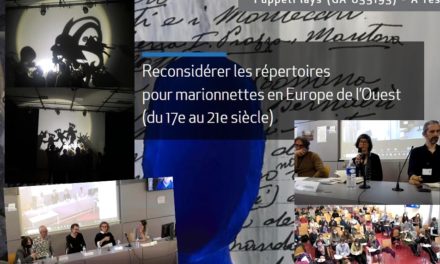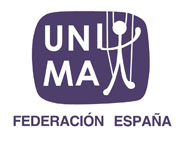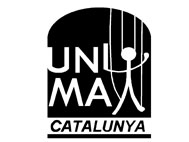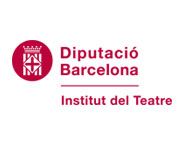I have in my hands the photograph on the invitation from the Mexican Fine Arts Institute to the act of homage offered recently to Mireya Cuetos for her seventy years as a puppeteer: Mireya, in black and white, young and seated amongst flowers, smiles in profile in a garden which her son, Pablo Cueto, – another fascinating character with a long career in the world of animated objects and theatre in miniature -, will later tell me belonged to Trotsky’s house in Mexico. After Trotsky’s death, Mireya would go to that garden of long-leaved plants and talk with his widow, the revolutionary Natalia Sedova. Talk. About what? Talk. A puppeteer and a revolutionary, puppets and revolution, puppet-theatre and the drive for social change, invincible dyad at the heart of the development of seventy years of work which today I hear about charged with silence, perhaps because there is so much, as I too sit, not in a historic garden, but in a chair opposite the legendary Mireya.
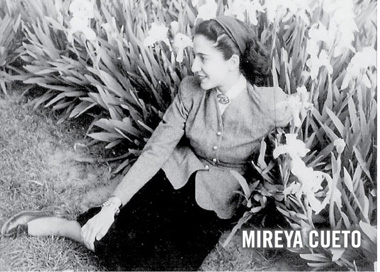
Invitation card to Mireya Cueto
I. Mireya in her room
Mireya is ninety years old; she lies, propped up, her eyes fixed on the light which comes in through the only window in her little room; we look at each other and with a question I try to lead her back to her childhood and, especially, to her adolescence full of journeys in carts and pony traps, through poor and out-of the-way regions, any and everywhere in Mexico, with her parents Germán and Lola Cueto and an entourage of puppets, at a time when faith in puppet theatre was clear, serious, and puppets were accepted as the protagonists of a national literacy campaign.
Then she pictures herself, and it’s something she will tell me more than once in the course of the conversation: as a child she would cry, pursued by her sister Ana, during the years they lived in Paris, until suddenly she saw in the doorway, as if surrounded by a halo, the enigmatic figure of her Aunt Maria, Maria Blanchard the legendary painter about whom Lorca, Ramón Gómez de la Serna and Claudel – among other great authors – wrote. In his elegy for her, Lorca noted of Mireya’s aunt “Friend of a sweet shadow which I have never seen but which has spoken to me through certain mouths and certain landscapes where there was never a cloud, a furtive step or frightened animal in a corner… She put up with everyone else and ended up alone, with no human communication, so alone that she had to seek her invisible homeland, where her wounds ran, mixed with the whole stylised world of pain”. But into this world ran Mireya who planted a kiss on her cheek to make her forget her physical misfortune, the hump on her back which isolated her and brought her closer to God in the urgency of another devotion. Mireya recounts, her eyes staring at the window’s light, how she posed for Maria as a child, how the artist gave her a painting as a gift, and a single name emerges from her lips: San Tarcisio, child martyr, her painting, her favourite painting. She says “He was a child martyr because…” Silence. She falls silent and we decide to respect this silence for a long time; in the wideness of her gaze I perceive that she is captivated (and I along with her) by time, her time, that other time.
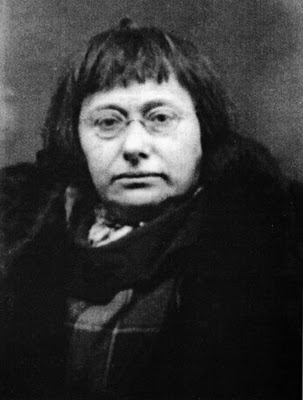
Painter María Blanchard, Mireya Cuetos
II. Mireya with a puppet for the first time
“It was with my mother”, she exclaims, euphoric, when I ask her about the first time she worked a puppet. She tells me how skillful she was with her hands, at the same time moving them in the air as she explains that Lola Cueto asked her to make the wigs, or the bodies of certain puppets: “Make Washington’s wig”. But one day, a day on which she travelled she says, sitting on top of a suitcase, – “when you’re young you can put up with carts and traps” -, they arrived at the Feria de San Marco (Saint Mark’s Fair) to present Macario, Gorgonio Esparza y La muerte (Macario, Gorgonio Esparza and Death) in which, needing somebody to work the angel, Mireya took the puppet and gave her first speech, seed of her seventy years of work: “ahí nos viene corretiando un señor muy hablador trae cara tan enojada que a todos nos da terror.” (Here, rushing about, comes a man who talks a lot; his face is so angry we’re all terrified. [The original text rhymes. Translator’s note.])
Never, since that first time, did she stop working with and for puppets. Mireya wrote, directed, founded venues, created radio programmes, made puppets, taught, – there are festivals and prizes named after her – , published, dreamed, and dreams still.
III. Anecdote about children as audience
Mireya smiles, she lights up every time she says the word “children”, the word and what surrounds it imbues her life with a kind of magic, the instant she pronounces it. The “children stuff”, she says, as if she could write a collection of anecdotes about the reactions of children in the most distant villages, children from the past, without resources, without radios and without anything who, on seeing the truck bouncing along, would all pile together and shout “The puppets are coming, the puppets are coming”. She remembers one day when they went into a zone through which a way had been opened for the very first time so that the puppeteer’s lorry could enter (a lorry painted by Lola); some of the children expressed their surprise to each other on seeing the puppets during the show:
«And how do they move them?»
«Oh honestly! With electricity.» The little know-alls.
Mireya is quite sure, what she likes about puppets above all, she says, are their infinite possibilities. So, not all her shows were only for her adored children’s audience.
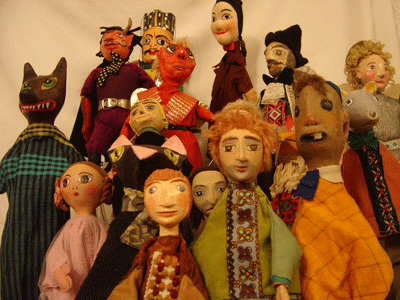
IV. Mireya’s books
Mireya has a magnifying glass beside her bed, she puts it up to her eye and looks at me through it while she tells me that with the help of this object, when she can, she reads. Quevedo, Lao Tse, The Thousand and One Nights, Sabines – a woman academic puppeteer, a historian. If Mireya’s parents came to puppets from the plastic arts, and her son from theatre and political protest, her journey had its beginnings in literature; there on the shelf is the great Quijote, her Quijote, almost at her bedside. “I really like Quijote” she says with her magnifying glass in her hands, and she tells me that she created a puppet version for children and she tells me as well how she liked to read philosophy. We talked about León Felipe. She recounts how the poet was a great friend of Germán Cueto, her father, and that one day when he came to visit them, the poet took advantage of the fact that her daddy went to wash his hands to tell her: “Your daddy is the best man I’ve ever known” “I’ll never forget it” she says proudly, and quotes him: “Once more the figure of Don Quijote is seen, crossing the plain of La Mancha.
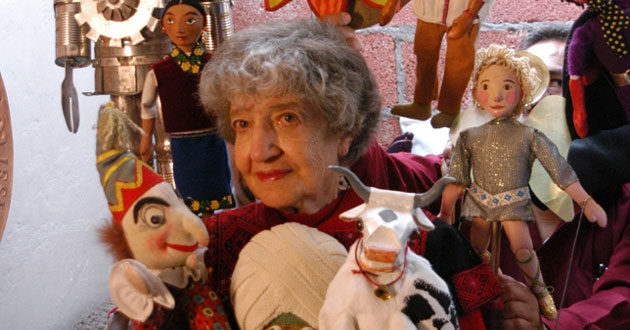
Mireya with some of her puppets.
V. Lapsus
The phrase escapes on the back of a sigh that fills her seventy years of work, fills the entire house with its two cats and a big, green hectare of land; she lets it out and the soup that’s being eaten by those outside her room, in the kitchen, trembles, and before she lets it go she is suspended, with an expression which is the impact on the skin of her face of having been embraced by so many epochs; I tell her I am her messenger, her mouthpiece, for a new generation of puppeteers in many countries who will read her words, her wish, for this magazine, her thoughts at this atemporal moment, she sighs and she lets out: “They musn’t be afraid….. (She leaves an eternal, necessary pause)…. Afraid of creating creativity.”
We fall silent and remain so and I realise that what I have collected in my voice recorder comprises principally the silence that makes up Mireya’s memory, Mireya, the infinite puppeteer.
Translation by Rebecca Simpson

